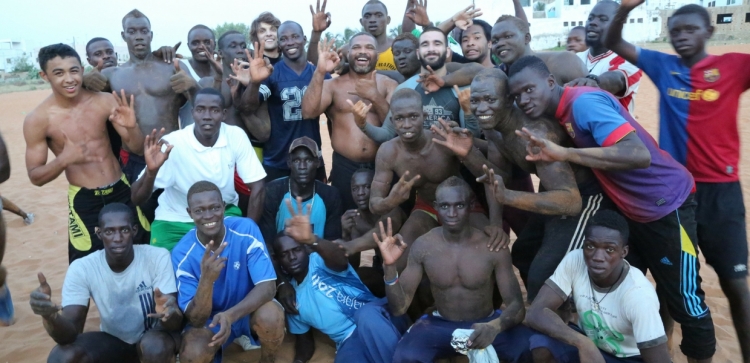Fighting For Change

Mixed Martial Arts, otherwise known as MMA, is by far the fastest growing sport in the world. Armand Rupert, otherwise known as A.K., grew up in Senegal and developed not only a connection to the continent of Africa but a passion for mixed martial arts "long before it was as mainstream as it is now." In 2013, Rupert had the idea of combining his passion for Africa and MMA– ultimately recognizing the prominent Martial Arts culture existing in Africa and the void that exists in its accessibility. Rupert wanted to create a non-profit organization with the aim of forming mixed martial arts communities which would develop opportunities for young African athletes, proposing the idea to a friend. "He thought it was an exciting idea, but you know, it was wild. We both knew it was completely outside the box, but we got to talking about it and decided that we wanted to try to do this," Rupert says. They reached out to various high ranking members of the Judo Federation in Senegal stating their proposal and with that, The LionHeart Initiative was born.
"IT WAS WILD. WE BOTH KNEW IT WAS COMPLETELY OUTSIDE THE BOX."
"Martial arts are much more comprehensive than just fighting, and winning a particular combat," Rupert says. "It comes with a philosophy of discipline that's attached to it.” These philosophies are derived from traditional martial arts– such as Karate, Jiu-Jitsu, Tae Kwon Do, and Muay Thai. These “traditional” martial arts were developed thousands of years ago, while the MMA that you now see on television was developed in the 90’s. Modern MMA is essentially an evolution of more traditional forms of martial arts.
Although modern mixed martial arts don’t carry the pure philosophy of their more traditional counterparts, it’s still heavily influenced by the philosophies of these traditional Martial Arts which prefaced it. "In the early 90’s, MMA was extremely brutal," Rupert says. It was pitched and brought to light as almost a 'free fight', but it has evolved and has turned into a much more regulated sport with clear set rules, and proper equipment. What we are trying to introduce in Africa is this regulated version of MMA.” Since MMA is the fastest growing sport in the world, LionHeart will have the means to create tangible and financial opportunities for the program's athletes. Thanks to the LionHeart Initiative, the multi-billion dollar MMA industry is beginning to turn an eye towards Africa and the young and talented athletes who have previously lacked opportunity.
"In Senegal, there are six to seven thousand registered wrestlers. Laamb, a form of wrestling, is a national sport. Now, Imagine seven thousand pro baseball players in the US, but only two or three of them are actually making enough to live a lifestyle that consummates with their talent. In Africa, you have thousands of kids that are scraping a life together, training six to eight hours a day as pro athletes, but they simply aren't making it. The initiative is really about creating opportunities for those kids to succeed."
In November, a group of Parisian fighters flew to Senegal to run a series of Muay Thai seminars for one week. The volunteers, which are referred to as LionHeart contributors, range from professional mixed martial artists, high-level coaches to even low-level amateur fighters and MMA enthusiasts. Rupert states, "We tend to attract folks (volunteers) ranging from all over, but particularly a lot of people with a connection to Africa. Many of our European partners are guys that are of African descent that live in Europe. By virtue of living in the West, they were given an opportunity to develop these skills. Now they're willing to go back (to Africa), and give back."
However, an issue remains, funding. The LionHeart Initiative is a 501 (c) (3) non-profit organization and although its vision does not revolve around money, it needs it. “We have no money,” Rupert explains bluntly. "We don’t have big sponsors, we don’t have big partners. I think that something that's noteworthy is the fact that all of these contributors–none of which are rich—are willing to come down and help. They volunteer both their time and their money to Africa. We stick to our principles. We don’t want to get bought off by some promotion company that wants to make a quick buck. To us, It’s more than that. It has to be more than that.” Although widely successful since that first phone call four years ago in 2013, Rupert admits that he thought that the Initiative would be further along in 2017. However, their “limited” success can be attributed to their deep-seated, core values. “We refuse to lose our integrity," Rupert says, “We refuse to sell out.”
At the heart of it, The LionHeart Initiative is truly about developing, and creating opportunities for these young athletes. In the long-term, LionHeart hopes to motivate athletes to stay with the program in Africa for longer periods of time. "In reality, a week here and a week there isn’t enough,” Rupert says. "In order to be successful, you have to convince the young African athlete that it's doable, you’ve got to show them something closer, more tangible, that he can wrap his hands around. We want foreign martial artists to go down there and live on a shoestring budget, which is all we can afford, and truly experience the community around them.” The true purpose of the LionHeart Initiative lies not in money or even in the sport of MMA itself, but in connecting people. LionHeart seeks to connect the individuals who really want to make the world a better place, using their passions and their skills to help communities in need, ultimately uniting people across the world that share these values.







